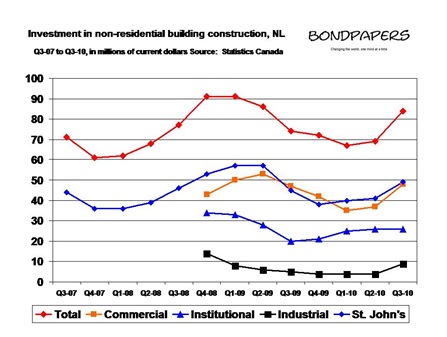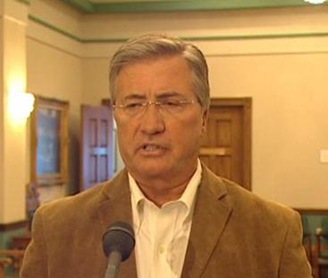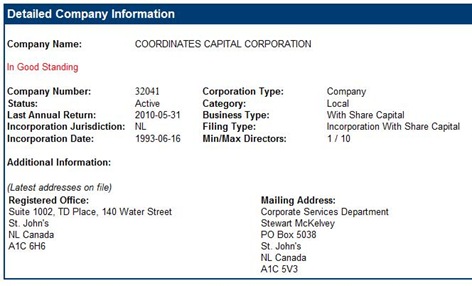Anyone who wants to understand the reason why the fishery in this province remains an economic and social disaster need look no further than recent comments by the former Premier and former fisheries minister who had not one but two kicks at the portfolio.
Tom Rideout spoke to a young audience in Corner Brook the other day. As the Western Star reports it, Rideout gave only two options for the future:
One option is to let the private sector take over the industry — whereby non-profitable plants will eventually close and licences will lapse, solving the problem of over-processing capacity.
“It will be messy, but it will solve the problem,” he said.
However, as the past has shown, he said, whenever a processor closes a plant, often another group will claim they are able to do it better.
“The communities get together, their political leadership get together, they demand the licence be transferred, the new operator limps on from one crisis to another, and the communities continue to what I would call a slow march to their own death,” he said.
The second option is for government to buy out processors in geographically defined regions of the province. He said there are many employment opportunities on the Avalon Peninsula, that the plants in these areas can be be more easily closed and these areas could survive.
By his own version, Rideout served as fisheries minister in the 1980s –at a time of supposed boom – and then served in the same job about 20 years later, at a time when things were much worse. Rideout’s version of that in-between time [CBC audio link] is, to put it generously, a bit self-serving. For the moment, however, let us stick with Rideout’s version of events in the 1980s and then the later bit within the past few years.
During Tom Rideout’s tenure as fisheries minister in the 1980s, the fishery was in the early stages of a decline that led, ultimately to the 1992 cod fish collapse. The policies at both the provincial and federal level encouraged people to fish anything and everything that could be caught. The boom, as Rideout sees it, was entirely a time of artificial plenty brought about by policies that contributed significantly to the 1992 collapse. Things looked good but anyone who wanted to see could tell things were bad.
If we did not know this from other comments, as we do, we know that the fishery was in a very difficult state because Rideout tells us that in his interview with CBC. Someone else can ask why it is that Rideout at one time claims things were great when he was minister and at the same time acknowledges the arse was pretty much out of ‘er at the same time.
Suffice it to say that Rideout’s appreciation of his original tenure, therefore is superficial, at best. He apparently has no grasp of what happened in the 1980s. he has some understanding of the basic problem – too many people, too few fish – and the political dynamic that helped to create it in the 1980s when he was minister. This is the same dynamic that took hold once again in the late 1990s when another fisheries minister did what Rideout and his cabinet colleagues did in the 1980s.
That is, they operated under the assumption that the provincial government must interfere in the fishery to a degree it does not do in other sectors of the economy. You can see this in the way Rideout describes the two options, quoted above. In both, it is the provincial government that manages the fishery as it does now by controlling the issuance of licenses.
What Rideout describes as “letting the private sector take over” is, of course nothing of the sort. He is basically describing the situation that exists today. That’s how he can then describe this part of the scenario:
“The communities get together, their political leadership get together, they demand the licence be transferred, the new operator limps on from one crisis to another, and the communities continue to what I would call a slow march to their own death…”.
If the fishery were left to run as a business, there would be no licenses to transfer based on political criteria. A company could apply for a license to operate business and, so long as it met the same business regulations as all others, it would open. Licenses would be issued only on the basis of operating a business, not on the location of the plant, the type of fish or anything of the sort. These are all artificial restrictions on business that reflect the very situation in the time Rideout was first the fisheries minister that created the political morass that continues today.
As long as the plant could make money it would stay open. If it could not make money, then it would close. Period. Rideout is apparently concerned about workers. Well, undoubtedly some bright people could figure out how to deal with that just as bright people in other industries do now.
That is what would happen if the fishery were run as any other type of industry. And incidentally, the fishery department would comprise a few officials in another department of food related industry or something of the sort. A small fishery department would be nothing but a reflection that government finally got out of the Frankenstein experiment in social engineering Rideout - and a great many others - helped run.
Rideout’s second scenario is nothing more than a dolled up version of the first, but with a much greater financial burden for ordinary taxpayers in the province.
In short, whatever Tom Rideout told that young and impressionable audience in Corner Brook a couple of days ago, he showed them how persistent is the thinking that created the mess in the fishery and that continues to torture the men and women of the province today with the same blinkered thinking.
Rideout is right about one thing though, aside from his admission that like the rest of us he has made mistakes. Rideout is right that nothing of any consequence will happen as long as we are in this pre-election period. We can add to it the pre-leadership period and then right after that, the next pre-election period. That is always what happens as long as politicians of a certain type want to play God in the fishery.
Until politicians decide to get themselves out of the fishing industry altogether, the people involved in the industry are doomed to live daily in reruns of the same social slasher film.
Update: Here’s the CBC online version of Rideout’s comments.
- srbp -
Related:









